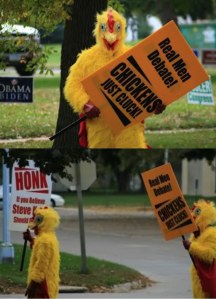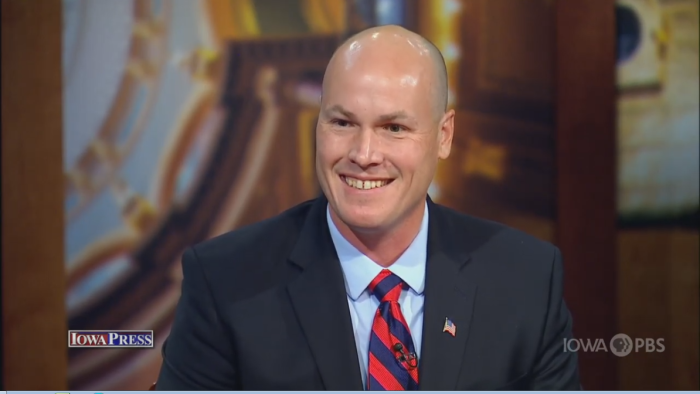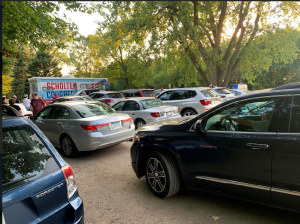Susan Nelson: If J.D. Scholten goes to Washington, he will carry with him thousands of stories told by rural people struggling to keep their heads above water. -promoted by Laura Belin
The conventional wisdom about the congressional race in Iowa’s fourth district is that Republican Randy Feenstra is going to win, not because he’s Randy Feenstra, but because he’s a Republican. That conventional wisdom about IA-04 was nearly proved wrong in 2018, when Democrat J.D. Scholten lost to Representative Steve King by a little more than three percentage points. The near-miss helped the Republican congressional leadership decide to defenestrate King from congressional committees because he was a little too obvious about being a white supremacist. Four conservative candidates went after him in the primary, and Feenstra won.
Is IA-04 still a rural red district where Democratic ambitions go to die, or is Scholten going to finish the job he started two years ago? Without King on the ballot, will he still attract 25,000 Republican crossover votes? We will not know the answer until at least election night, or later. But Scholten has a lot going for him.
Polling: Scholten’s campaign is obviously having an impact. A mid-September Ann Selzer poll showed Scholten within 5 points of Feenstra (658 likely voters surveyed, margin of error plus or minus 3.5 percent). Scholten has an internal poll showing him within 2 percent (500 voters surveyed, margin of error 3.94 percent).
Recent internal Iowa Democratic Party polling in Trump-supporting legislative districts shows that the president has slipped, and some races are very competitive. The fourth district is an R+11 electorate, based on the 2016 presidential results, but high 2018 Democratic turnout is a hopeful sign for Scholten.
Organization: Scholten has a nimble organization, combining experienced staff with an eclectic group of interns and volunteers of all ages and a wide variety of skills. In the new normal of coronavirus, staff meetings are online, and people from all over the country are donating their time and knowledge to creative organizing. The campaign has adopted digital organizing tools used in the Warren campaign and others, and is creating some of its own. There is shared camaraderie, a newsletter for volunteers, regular meetups to connect newcomers with colleagues, and constant training in new tech tools as volunteers come into the campaign. They are working hard and having fun.
Grassroots outreach: Scholten’s motto is “You can’t fake showing up.” He showed up in all 374 towns in the 39 counties of this geographically vast district, finishing in Nashua, in Chickasaw County, on October 6.
In larger towns, his rallies were arranged like old-fashioned drive-in movies. Tune your car radio to the right frequency and you can hear him speak, standing in the bed of a pickup. In between rallies, he stopped at little towns that no one cares about, other than the people who live there, and listened to them describe their needs and their struggles. Through social media, or because they saw his rickety Winnebago, “Sioux City Sue,” roll into town, people would find out that he was there.
In hundreds of conversations, people shared their worries about the local grocery store being driven out of business by Dollar General, the price of crops being driven below the cost of production by government policies, the stifling impact of agricultural monopolies, their anxiety about the impacts of the pandemic, and their isolation on the wrong side of the digital divide.
If J.D. Scholten goes to Washington, he will carry with him thousands of stories told by rural people struggling to keep their heads above water. His audiences hear some of those stories in his speeches, and heads nod in recognition of hard luck stories about the donation containers in gas stations trying to raise money for yet another person with ruinous medical expenses, or the dairy farmer being driven out of business as processing consolidates and competition disappears.
The down-ballot races: Democrats have managed to field candidates in all but four Iowa House districts, even in some of the reddest ones. Each of these campaigns means more local voter contact, volunteers, and potential turnout.
The opposition: Candidate quality is not determinative in our polarized electorate, but it helps, or hurts. Randy Feenstra is a garden-variety Republican who voted the party line in the Iowa legislature no matter how extreme it became. He relies on a standard litany of Republican wedge social issues to attract conservative voters, and attracts support from Koch-funded groups like Americans for Prosperity with tax cuts and promises of trickle-down prosperity. His comments in live settings sound like repetitive memorized talking points. In June, Vox noted that “Feenstra’s policy platform isn’t significantly different from King’s: Much like Trump, he’s anti-abortion and supports hardline immigration policies including building a border wall.”
Steve King had people in chicken suits follow him around for his refusal to debate, but Feenstra avoids such humiliations by avoiding voters altogether.  Feenstra has no public events, except for appearances with his human shields, Governor Kim Reynolds and Senator Joni Ernst, in front of invited Republican audiences, where he delivers remarks and does not take questions.
Feenstra has no public events, except for appearances with his human shields, Governor Kim Reynolds and Senator Joni Ernst, in front of invited Republican audiences, where he delivers remarks and does not take questions.
While Scholten has put 7,786 miles on Sioux City Sue, going to every town and village in the Fourth District, Feenstra is meeting donors behind closed doors. We are not invited. Feenstra is hoping to run out the clock before the voters have a chance to focus on who he really is, and what he would vote for if he is elected to Congress.
Scholten’s skills apparently are not lost on Feenstra. They have appeared together previously, in small venues, so Feenstra has reason to know he is overmatched. In an August forum in Spencer, Iowa, Scholten talked about the impact of antitrust on agriculture, and Feenstra retreated to conservative bromides about abortion and China.
They have appeared together one time since, in an Iowa Corn Growers event that was not recorded. Feenstra opted to duck a broadcast debate on Iowa Public Television rather than allow voters to see the contrast between them on statewide TV. On October 3, Scholten appeared solo on Iowa Press after Feenstra refused to debate. The program is hosting debates for the other four federal races on the ballot, so Feenstra is the only one of 10 candidates for federal office who didn’t show up, prompting the appearance of a #ChickenFeenstra hashtag.
J.D. Scholten, the candidate: This lanky former baseball pitcher has transformed himself from the earnest and slightly awkward first-time candidate of 2017 into a confident, articulate master of rural and agricultural policy. He knows what people need, he understands why they need it, and he knows what he wants to do to help.
I got to know J.D. early in his 2018 campaign, and I am in awe of the candidate he has become. In some ways, he has not changed: he is the kindest and most open-minded person I have met in politics, and he is really bright. He reminds me of Tom Harkin, one of his political heroes–a visionary who left a legacy of service to Iowans, and to the “least of these” in the world beyond Iowa.
J.D. was beloved by the young organizers who came to Iowa for the presidential campaign. They would chant his name whenever Sioux City Sue rolled in with J.D at the wheel. Some of the presidential hopefuls rode along with him last year, and learned about the needs of rural areas. Some are still trying to help him.
Win or lose, his campaign will have an impact on Congress. But the Democratic Party institutions like the Democratic Congressional Campaign Committee (which ignored him, then embraced him after 2018, then turned their backs on him again after King lost his primary) have had no impact on his campaign. His funding comes from small contributions made by people who just want government to work for them, not for the powerful interests who are raining cash on Feenstra.
J.D. has listened intently to people in the fourth district, and has become their champion. He is motivated by his commitment to his dying grandmother, Fern, to save their family farm, and wants to help all the farm families like theirs. A devout person, he is motivated by compassion and a sense of responsibility for others. He wants to end the cruel distribution of access to health care through GoFundMe, or donation boxes on gas station counters, to people who are left out of the current system. He wants to end monopolies, especially in agriculture and health care, and end the disparities in this country between the powerful few and the rest of us struggling to get by in a pandemic and a recession. He has a vision of farmers in IA-04 leading the fight against climate change and being rewarded for their efforts, instead of being driven out of business by monopolists.
You can’t fake showing up. If we send J.D. Scholten to Congress, he will keep showing up for us.
https://www.facebook.com/Scholten4Iowa/posts/736335186963620





3 Comments
He so very much deserves to win...
…and so many of us in Iowa really hope he will, and some of us have donated time and/or money to help. But he’s a winner to many of us whether he wins or not.
And who knows what redistricting will bring in a few years. Wouldn’t it be interesting if the Fourth District suddenly became significantly more competitive.
PrairieFan Thu 8 Oct 1:55 PM
This isn't 2016
I outlined the reasons I think he has a shot. A lot of Republicans voted for him in 2018, and he has been hearing on the trail that many are sticking with him. I am also encouraged by the massive number of ABRs being turned in by Democrats.
susaniniowa Thu 8 Oct 7:49 PM
Just to clarify, I agree that he has a shot this year...
…and that’s why people I know, myself included, have donated to his campaign. I also think Iowa has a shot, after the current census, at getting a more politically-competitive 4th district. Here’s to both shots.
PrairieFan Tue 13 Oct 2:08 PM